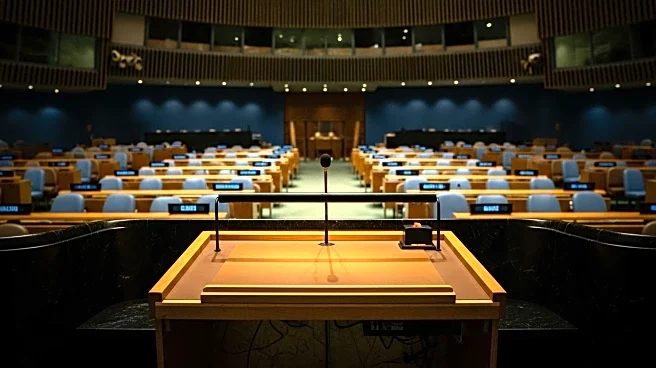What is the story about?
What's Happening?
During Prime Minister Benjamin Netanyahu's address to the United Nations General Assembly, delegates from various countries, including those from the Arab and Muslim worlds, as well as some African and European nations, staged a walkout. This action was seen as a protest against Netanyahu's policies and statements, particularly concerning Israel's stance on regional issues. The walkout was described as a significant moment of diplomatic dissent, emphasizing the ongoing tensions between Israel and several UN member states. The event was characterized as a 'masterpiece of optics,' suggesting that while it did not alter the substance of the speech, it shifted the focus and highlighted the diplomatic rift.
Why It's Important?
The walkout during Netanyahu's speech underscores the persistent diplomatic challenges Israel faces on the international stage, particularly with countries in the Arab and Muslim worlds. Such actions at high-profile international forums like the UN General Assembly can influence public perception and diplomatic relations. The protest reflects broader geopolitical tensions and disagreements over Israel's policies, which can impact international negotiations and alliances. This event may affect Israel's ability to garner support for its initiatives and could influence future diplomatic engagements and policy decisions.
What's Next?
The walkout may lead to further diplomatic discussions and negotiations as countries reassess their positions and strategies regarding Israel. It could prompt Israel to engage in dialogue with dissenting nations to address their concerns and potentially mitigate tensions. Additionally, this incident might influence future UN sessions, with countries possibly preparing more coordinated responses to speeches and policies they oppose. The diplomatic fallout from this event could also impact bilateral relations and international collaborations involving Israel.
Beyond the Headlines
The walkout highlights the power of symbolic actions in international diplomacy, where gestures can sometimes speak louder than words. It raises questions about the effectiveness of such protests in achieving tangible policy changes and whether they serve more as expressions of discontent rather than catalysts for dialogue. The incident also reflects the complexities of international relations, where historical grievances and current policies intersect, influencing diplomatic behavior and strategies.
















